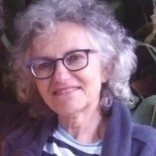Fall
A. J. Bermudez
The morning after my grandfather dies, my inbox is full of confetti emojis, bottles of champagne. Messages in all caps reading: “LET’S CELEBRATE!”
It is the morning of November 7, and Joe Biden has just won the presidency. I edit my grandfather’s obituary while watching the news. An aunt has seen fit to craft the document in Comic Sans, which I convert to a more sober serif before reviewing the details.
Loved polka music.
Loved watching sports.
Loved his grandkids.
Somewhere in Nebraska, some member of the family has definitely already made a joke about Papa intentionally dying just before the election was called for the Democrats. In his garage, which is larger than my apartment, a Romney sticker still clings to the bumper. He would wear American flag suspenders on the Fourth of July. My grandfather was a farmer, then a carpenter. His plan, coming back from the war, was to be a banker. To my knowledge, he never held a job that doesn’t appear in the opening sequence of The Oregon Trail.
My grandfather’s obituary is riddled with Lutheran-Nebraskan euphemisms. Gerhard didn’t die; he was “called to his heavenly home.” There’s no funeral, but rather “a celebration of his life and eternal salvation.” I respect these flourishes, as I did when my father died, and then my mother, all respectfully channeled through the same rural Nebraskan funeral home, church, cemetery. There’s a spot there where I can be buried, if I so choose.
Every time this happens, I swear it’ll be the last time, knowing it won’t be. I dread it, not only the fact of it, the viewing and service, or the coleslaw and Jell-O salads under the church basement fluorescent lights, but the place itself. It’s changed (I have, too, admittedly), but it’s different than the barbeque-smoke-thick summers of my youth, the borrowed bicycles and glowsticks swung in the empty lot across Sheridan. Places do change, as people do.
The last time I was here was for my mother. She was driving to bring a pair of shoes to my grandfather when she was hit by a driver on the same road we’re driving now. He wore those shoes for years. My brother and I flew out, proofread the headstone, cleared the house, signed papers, drank $4 Woodford at JD’s on the edge of town, halfheartedly tried to convince anyone we were old enough for any of these things.
The airport in Los Angeles is a party—the whole city is—but when I get off the plane in Nebraska, it’s like the whole state is in mourning. We’re mourning for different reasons, of course—I’ve been watching the cabinet conjectures and victory memes with alacrity—but I appreciate the concurrence, however inadvertent, between interior and exterior moods.
This is America: to start in one place and end in another. To celebrate and mourn. To survive, or not. For all of it to be true at once.




